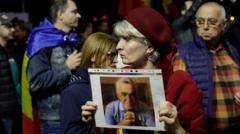In Romania, proposals to renounce commemorations of WWII fascists have met with resistance, revealing a complex relationship between national pride and historical awareness. The rise of ultranationalist perspectives highlights ongoing struggles regarding the country's identity in the wake of its troubling past.
Romanians Clash Over Fascist Legacy as Ultranationalist Sentiments Rise

Romanians Clash Over Fascist Legacy as Ultranationalist Sentiments Rise
The controversial legacy of Romania's World War II fascists prompts a resurgence of ultranationalist sympathies, igniting debates on national identity and historical accountability.
In Romania, a proposed initiative to rename a street in Bucharest after a controversial World War II figure has become a flashpoint in the country's ongoing struggle with its fascist past. Diana Mardarovici, the city councilor behind the proposal aimed at erasing the name of Mircea Vulcanescu—a philosopher and sociologist convicted of war crimes—expected little opposition. Instead, her efforts were met with silence from fellow council members, who, while not endorsing Nazism, felt that acknowledging past atrocities undermined their national pride.
This episode is part of a broader trend in Romania, where similar attempts to remove or rename streets and monuments connected to fascist figures have been repeatedly stymied. Many of these individuals, once prominent in the cultural landscape during the 1930s and 1940s, are still celebrated for their contributions to Romanian literature and thought, despite their alignment with the Nazi regime.
Experts argue that this reluctance to confront history reveals a deeper societal tension between acknowledging Romania's involvement in wartime atrocities and maintaining a cohesive national identity. The persistence of ultranationalist sentiments, compounded by economic and social factors, further complicates discourse surrounding historical accountability.
As Romania grapples with its past, the refusal to confront the legacy of figures like Vulcanescu suggests a troubling trend: a segment of the population appears increasingly drawn to ultranationalist ideologies that minimize or romanticize the facts of their country's history. This ideological shift raises questions about how Romania will navigate its historical narrative and what it means for its future societal cohesion.





















